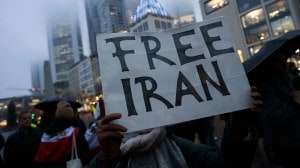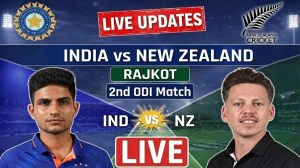Where146;s the party?
Although the BJP is the party experiencing turmoil, the Congress should seriously begin to worry about its own future. On the surface, thing...

Although the BJP is the party experiencing turmoil, the Congress should seriously begin to worry about its own future. On the surface, things seem well. It has no leadership crisis, no self-destructive rancor. The prime minister8217;s performance ratings are high and he is very difficult to attack personally. The Opposition is in disarray. UPA allies occasionally extract their pound of flesh, but none of them has an incentive to bring down the government immediately. The economy is holding steady. But the placid surface can barely disguise the Congress8217;s long term problem. The Congress acquired power without a mandate but it is not being able to leverage its position in power to consolidate its fortune.
The party is showing absolutely no signs of reviving in UP and Bihar. In Maharashtra it is being upstaged by the NCP. The NCP can also fragment Congress support in Gujarat. Its hold over Karnataka is getting more precarious, and by the time the next election comes around its hold on Andhra will be less solid. It will probably be a more powerful force in Madhya Pradesh, Rajasthan, Gujarat and a handful of small states, but even a great performance in these states will not be enough to ensure that it can hold on to its current position. The BJP may be losing momentum, but the Congress is still not gaining from it. It needs a strategy against state level opponents rather than the BJP. Three years is a long time in Indian politics, but the current trends portend a greater fragmentation of Indian politics rather than a consolidation of the two main parties. A third front is a genuinely likely electoral possibility, even if the prospects of it providing a stable government may appear dim.
The reason the Congress should worry is this. Usually a party on a roll gathers some moss, yet the Congress has frittered the advantage of power for a number of reasons. The Congress8217;s Achilles heel since the Emergency has been the suspicion that it could play footloose with institutions, and that its principles would crumble under the weight of the most trivial opportunism. Unfortunately, the Congress, even for its supporters, commands sullen acceptance as a lesser of many evils, but not enthusiasm about its trustworthiness as the custodian of propriety and principle.
Its biggest asset immediately after coming to power was the moral aura that surrounded Sonia Gandhi8217;s renunciation of power. But the returns on that moral capital are increasingly diminishing. The renunciation of position was of course not the renunciation of power and cannot carry authority forever. In so far as she still carries some mass appeal, that burst of energy Sonia Gandhi displayed around the last elections seems to have dissipated. This is not a leader on a campaign blitzkrieg to revive the party in the face of difficult challenges. The reluctance to hold intra party elections, the choice of people to whom party responsibilities are being delegated, suggest more a holding pattern than a recipe for revival. And more talk about Rahul Gandhi8217;s future role at this stage diminishes Sonia Gandhi8217;s credibility. It makes it easier for opponents to remind voters of the ills of dynasty than the virtues of renunciation. If the party succeeds, Rahul Gandhi will find an indispensable place in it; but if the strategy is geared to protecting Rahul Gandhi, the party will fail.
Organisationally, the Congress8217;s biggest challenge has been its inability to connect to local realities in politics. This task has been hampered by a top down political structure. This ensures that newly mobilising groups and leaders at the local level are not attracted to the party, since the path to the top depends so much on the caprice and loyalty tests of one leader rather than clear and settled procedures. The party, even at the level of local units, remains in the hands of individuals who have more access to the top echelons of the party than knowledge about voters. There is no solution to these challenges other than systematic intra party elections.
The Congress is also facing two structural dilemmas. The prime minister8217;s personal ratings are less consequential for a party, as the BJP discovered in the case of Atal Bihari Vajpayee. The BJP also discovered that there is a disjunction between technical policy competence and the themes that animate mass politics. Congress has also not been able to find a way to link its policies to a concrete political strategy. What is going to be the political link between the genteel world of Manmohan, and the issues raised by the rough and tumble of Yadav-Dalit battles, Jat discontent or Jayalalithaa8217;s populism? This disjunction is deep but is exacerbated by the fact that the Congress likes to marginalise leaders who have at least some vestiges of the links between policy and politics. However sound they might otherwise be, its policies are not going to create a new distributional coalition. The actual effects of its social programmes may not yield results in time; its supposed big push on agriculture and infrastructure is still at the discussion stage. It suggests an odd lack of political judgment that the government has taken on the Left on ten per cent disinvestment of BHEL. This is a politically irrelevant issue. Even in economic terms, the Congress would do itself a favor by taking on the Left on something genuinely consequential for growth like power sector reform. Else, the Congress will appear strong on inconsequential matters and weak on important areas.
A prominent Congressman recently asked me to name individuals who could be considered Congress intellectuals. When I hesitated he added helpfully, 8220;those who would be loyal to Soniaji.8221; The idea of a party intellectual is usually an oxymoron. But the Congress carries no sense of intellectual excitement; it has ceased being the center of debates. This is a matter of consequence for would-be party intellectuals. It suggests that for all its talent, the party cannot set the terms of debate or an agenda. And a party that cannot set this agenda is unlikely to be able to break the current mould of politics. Unfortunately, the current mould has given the Congress a freak chance at power; it does not portend an augmentation or consolidation of its fortunes. That will require an extraordinary effort of will and political imagination. But time is running out.
- 01
- 02
- 03
- 04
- 05































